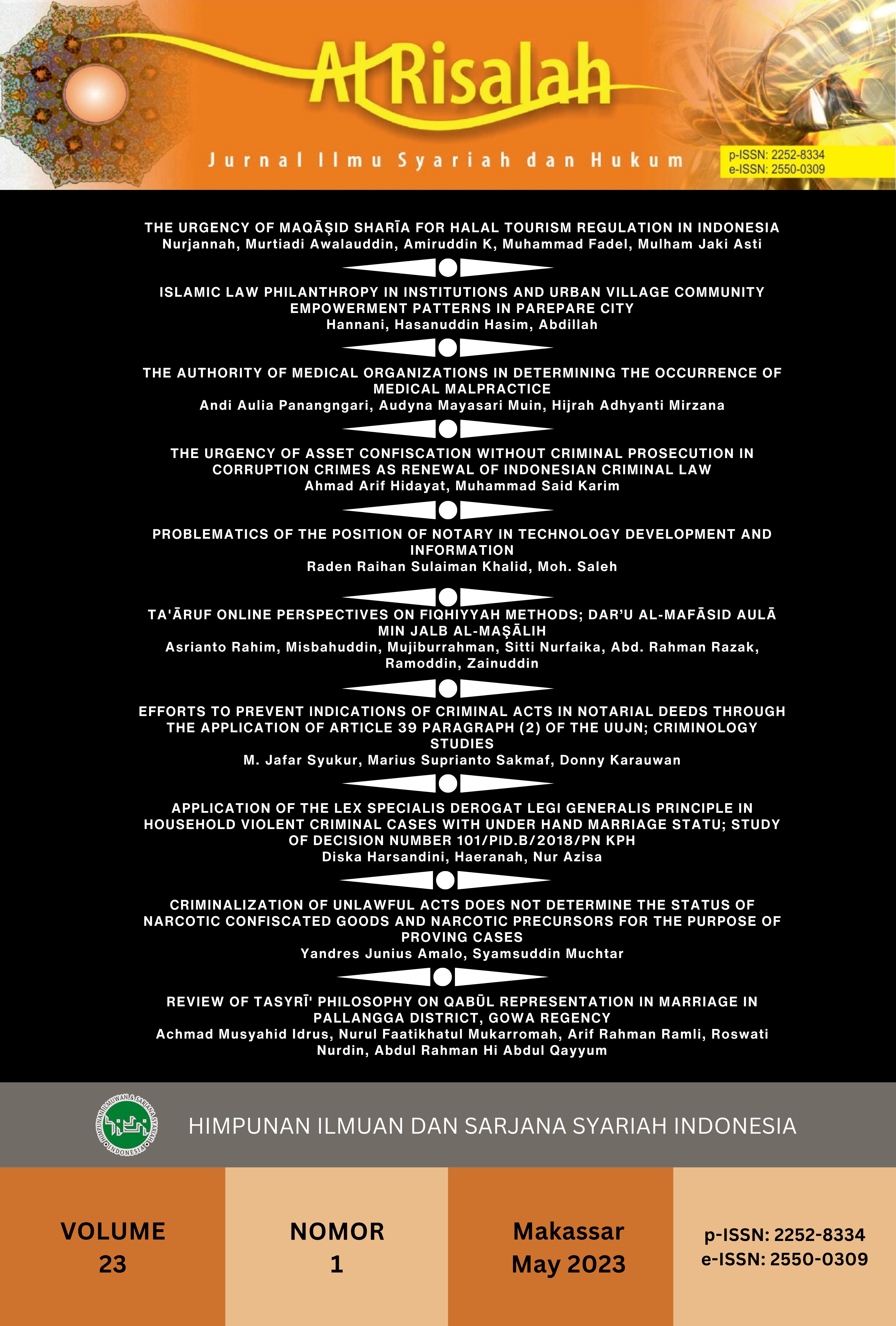TA'ĀRUF ONLINE PERSPECTIVES ON FIQHIYYAH METHODS
DAR’U AL-MAFĀSID AULĀ MIN JALB AL-MAŞĀLIH
Abstract
Ta'aruf is one of the realms of social interaction which is the door to building a relationship between human beings in general. This has been discussed in the Qur'an which is a book that contains instructions for humans, that humans are created with different shapes or characters. The goal is for people to get to know each other. In other terms known as the term ta'aruf earlier. However, in this discussion the word ta'aruf is interpreted more specifically as an effort to recognize the opposite sex to be a life partner. So, ta'aruf is part of the initial stages before building a lasting relationship, namely marriage. Related to this, the law or sharia whose function is to fill the space for all community behavior, also follow these developments so that they can always provide explanations about new things that arise. The aim is to be able to provide legal certainty regarding a new lifestyle that is developing in society. This study uses the library method, namely by collecting as much data as possible from previous research and then concluding it into new research, it is intended that this research will later become one of the sources for similar discussions.
References
Azzulfa, Fatihatul Anhar. “Biro Jodoh Online : Kebutuhan Atau Tuntutan.” Al Maqashidi : Jurnal Hukum Islam Nusantara 3, no. 1 (2020): 35–49. https://doi.org/https://doi.org/10.32665/almaqashidi.v3i1.865.
Bagaskara, Ali Akbar, and Roykhatun Nikmah. “Praktik Ta’aruf Online Melalui Aplikasi Ta’aruf Online Indonesia Perspektif Fikih Munakahat.” Surakarta: UIN Raden Mas Said Surakarta, 2023.
Chotban, Sippah. “Wedding Problems Via Phone: Islamic Law Perspective.” Al-Risalah Jurnal Ilmu Syariah Dan Hukum 21, no. 1 (2021): 26–35. https://doi.org/https://doi.org/10.24252/al-risalah.v1i1.21351.
Dadan Ramadhan, Wira Mahardika Putra. Ta’aruf Jalan Indah Menuju Nikah. Jakarta: PT. Lontar Digital Asia, 2019.
Hamdi, Isnadul. “Ta’aruf Dan Khitbah Sebelum Perkawinan.” Juris: Jurnal Ilmu Syariah 16, no. 1 (2017): 43–52. https://doi.org/http://dx.doi.org/10.31958/juris.v16i1.959.
Haq, Abdul. Formulasi Nalar Fiqih: Telaah Kaidah Fiqih Konseptual Buku 1. Surabaya: Khalista, 2006.
Haq, Islamul, Marilang, and Kurniati. “Islamic Criminal Law on Jarimah Zina’s Testimony: Uncovering the Conflicts Between Sharia Doctrine and Reality.” Al-Risalah Jurnal Ilmu Syariah Dan Hukum 22, no. 1 (2022): 52–62. https://doi.org/https://doi.org/10.24252/al-risalah.vi.26792.
Hasibuan, Ahmad Soleh. “Penomena Ta’aruf Online; Analisis Istishab Dan Maslahah Mursalah.” Jurnal AL-MAQASID: Jurnal Ilmu Kesyariahan Dan Keperdataan 7, no. 1 (2021): 93–107. https://doi.org/https://doi.org/10.24952/almaqasid.v7i1.3813.
Hasram, Khaidir. “Al-Qawaid Al-Ushuliyah Al-Tasyri’iyah Sebagai Basis Metodologi Fikih Kontemporer.” Mazahibuna: Jurnal Perbandingan Mazhab 1, no. 1 (December 21, 2019): 146–65. https://doi.org/10.24252/MH.V1I2.11127.
Hildawati, Hildawati, and Ayu Lestari. “Taaruf Online Dan Offline; Menjemput Jodoh Menuju Pernikahan.” Emik: Jurnal Ilmiah Ilmu-Ilmu Sosial 2, no. 2 (2019): 128–48. http://www.ejournals.umma.ac.id/index.php/emik/article/view/293.
Ilhami, Nuzula. “Budaya Ta’aruf Dalam Pernikahan; Sebuah Tinjauan Sosiologi.” Kuriositas: Media Komunikasi Sosial Dan Keagamaan 12, no. 2 (2019): 163–76. https://doi.org/https://doi.org/10.35905/kur.v12i2.1260.
Muchtar, Kamal. Usul Fiqh Jilid 1. Yogyakarta: PT Dana Bakti Wakaf, 1995.
Rosmita, Andi Nur Afifah, and Nasaruddin. “The Position of the Guardian in Marriage Perspective of the Hanafi and the Al-Shafi’i Madhhab.” Mazahibuna: Jurnal Perbandingan Mazhab 4, no. 2 (2022): 152–72. https://doi.org/10.24252/MH.VI.30969.
Shidiq, Ghofar. “Teori Maqashid Al-Syari’ah Dalam Hukum Islam.” Majalah Ilmiah Sultan Agung 44, no. 118 (2023): 117–30. https://jurnal.unissula.ac.id/index.php/majalahilmiahsultanagung/article/view/15.
Sulthon, Muhammad. “Hukum Islam Dan Perubahan Sosial (Studi Epistemologi Hukum Islam Dalam Menjawab Tantangan Zaman).” Jurnal Ilmiah Universitas Batanghari Jambi 19, no. 1 (2019): 27–34. https://doi.org/http://dx.doi.org/10.33087/jiubj.v19i1.548.
Usbikin, Imam. Qawa’id Al-Fiqhiyah. Jakarta: PT Raja Grafindo Persada, n.d.
Copyright (c) 2023 Asrianto Rahim, Misbahuddin, Mujiburrahman, Sitti Nurfaika, Abd. Rahman Razak, Ramoddin, Zainuddin

This work is licensed under a Creative Commons Attribution 4.0 International License.


